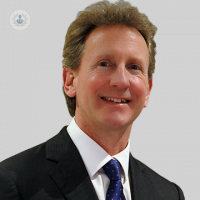When to see a doctor for voice disorders
Escrito por:There are many different types of voice disorders and voice problems, and in adults, they are much more common in elderly patients. Having good oral communication is something that a lot of people rely on, both personally of course, but also for their profession. Hence, experiencing a voice problem can be very disruptive and should be assessed by a doctor. Fortunately, with an accurate diagnosis, many voice problems can be effectively treated. Mr Brian Fish who is a top otolaryngologist discusses voice disorders and how they affect us.

How common are voice disorders in adults?
The term voice disorder covers a huge spectrum of possible problems. If you think of voice production, it is best to think of it in having three components:
- First is, you have to have enough air coming up through the vocal cords to make the vocal cords vibrate to produce noise.
- Secondly, the voice box itself has to be working properly to produce the raw sound that then becomes your voice.
- Thirdly, you have different structures between the voice box and the outside world, which form words from that noise. These include the tongue, your cheeks and your lips.
Therefore, all it takes is for one of these components to go a little bit wrong and you have a voice disorder.
There have been various studies looking at how common voice disorders are, and generally, up to about 30% of adults would have had a voice problem at some point and at any one point, probably 6-7% of adults will have an ongoing problem with their voice. If you look at the elderly population up to about 50% of people will have had a voice disorder. Certain subgroups as well have a higher proportion of voice disorders and usually, those are professional voice users and groups, such as teachers, in particular.
How can your voice be affected by your job?
In modern society, there is an increasing demand for oral communication in many occupations. It has been estimated that up to a third of occupations need good oral communication. The obvious ones are teachers, entertainers, singers, lawyers, clergy, sales representatives and fitness instructors.
These people have to look after their voices and there are many things which can contribute to problems with the voice, such as:
- Poor acoustics
- Poor atmosphere
- Vocal load (how much you have to talk, how loudly you have to talk and how long you have to talk for)
Some professions, such as actors and singers, will often have vocal coaching, which means that they receive tips and advice to help them with producing a good voice and keeping their voice in a good condition. However, many other occupations, like teachers, often do not get any help at all and are expected to go into a very variable environment and use their voice for prolonged periods of time. As a result, often those professions will have more of an issue in terms of keeping their voice healthy.
Read: Looking after your voice
When do you recommend going to see a doctor?
There are two reasons for seeing a doctor with a voice problem:
- To exclude a serious physical cause for it (e.g. cancer of the voice box or related structures).
- If your voice problem is impinging on your ability to do your job, or if it is affecting your communication ability. For example, if you are a teacher in the morning you have a normal voice, but during the day, that voice becomes sore and hoarse, but it recovers again the following day, then you need to have that addressed so that you can continue to use your voice where you want to.
Additionally, I would suggest seeing a doctor if you have had a hoarse voice for a prolonged period of time (i.e. three weeks or more), or if you are in a high-risk group of getting cancer of some sort (i.e. if you are a smoker).
Can voice problems be treated or reversed?
Many voice problems can be reversed, but the only way to know how to best address a voice problem would be to get an accurate diagnosis of what is causing it. Once the cause is established, treatment can begin, which will vary depending on the cause.
You can split voice problems into two large groups:
- Physical problems with voice production or the voice box (e.g. cysts, vocal cord nodules, cancers, acid reflux for postnasal drip) are often treated successfully with surgery or medication.
- Functional problems relating to the voice, such as muscle tension dysphonia, which results from overuse of your voice box, and psychogenic voice problems where problems with the muscle balance within the voice box result from stress or other psychological disorders. These problems often respond well to voice therapy which will aim to help with relaxation and well-being, as well as using exercises to rehabilitate the muscles so that they function properly.
Mr Brian Fish is based at the Nuffield Health Cambridge hospital and the Spire Cambridge Lea Hospital. You can check his availability for an appointment here.


